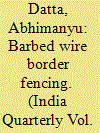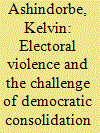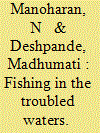| Srl | Item |
| 1 |
ID:
157791


|
|
|
|
|
| Summary/Abstract |
The Government of India decided to fence the entire India–Bangladesh border to prevent the illegal immigration from Bangladesh and to prevent the cross-border illegal and antisocial activities. Since the year 1986, the Government of India started the initiative to construct the border fencing in phase manner. The single wire border fencing which was created in the first phase has been replaced by the composite type of barbed wire border fencing a few years ago. Now the border fencing along the international border between India and Bangladesh has become a structural barrier for the Indian families living at the Country’s territorial edge. The families trapped in the geographical space between actual line of partition and the border fencing are living a restricted and deprived life within the limited land.
This study is basically focused on the impact of the border fencing on the citizenship rights of the Indian fenced out families. This article will discuss how the defensive policies of the Government are affecting the citizen’s rights at the border regions of the country and subsequently resulting in displacement.
|
|
|
|
|
|
|
|
|
|
|
|
|
|
|
|
| 2 |
ID:
157794


|
|
|
|
|
| Summary/Abstract |
Elections are the hallmarks of democracy; they also serve the purpose of peaceful change in government and confer political legitimacy on the government. Viewed from this prism, elections represent the expression of the sovereign will of the people. However, the conduct of elections in a plural society like Nigeria is often fraught with animosities and violence. Failing is the process to satisfy the test of popular participation and legitimacy. At the core of this bitter contest is the struggle for power by factional elite groups perceived as representing ethno religious and regional interest. Electoral seasons more than anytime else reveals the fragility and soft underbelly of the Nigerian state. The country’s electoral history is replete with narratives of flawed and disputed elections that have turned violent, resulting in numerous fatalities and reversing previous attempts at democratic consolidation. The 2015 general election was unprecedented in the annals of the country because for the first time an entrenched and incumbent party was defeated at the polls, and the country witnessed a peaceful alternation of power between contending political parties thereby fulfilling one of the preconditions for democratic consolidation. A tensed pre-election political atmosphere occasioned by the activities of the terrorist group, Boko Haram, that then controlled a large swath of Nigeria’s territory and a fragmented elite divided along ethno-religious and regional lines foreshadowed the election. Shuttle diplomacy by the United States secretary of state and the constitution of body called ‘National Peace Committee’ comprised of Kofi Anan, the immediate past secretary general of the United Nations, past presidents of Nigeria and leading clergymen and the postponement of the election date by six weeks before the electoral management body could deliver an election whose outcome was accepted by the contending political parties and averting the prediction of an apocalyptic endgame. This study seeks to engage the factors that make conduct of elections in Nigeria to be violent prone and undermine attempts at institutionalising a democratic tradition. The methodology is qualitative in approach, relying on secondary data from books, journal articles and newspaper commentaries.
|
|
|
|
|
|
|
|
|
|
|
|
|
|
|
|
| 3 |
ID:
157793


|
|
|
|
|
| Summary/Abstract |
India’s relations with its neighbours in the maritime domain have received less scholarly attention. Those studies that deal with India’s relations with its South Asian neighbours generally touch on political security, socio-cultural and economic issues. The maritime aspect is either ignored or tucked in as a part of other dimensions. The present study attempts to fill the gap in the literature by taking up the case of Sri Lanka. Sri Lanka is chosen as a case, not only because the island state is India’s closest maritime neighbour but also due to the existence of deep interactions between the two countries in diverse fields both at governmental and non-governmental levels. In the maritime domain, in the present context, technically speaking, there is no problem between the two countries. However, the fishermen issue remains one of the issues principally because of the Tamil Nadu factor. Analysing the issue in five phases, the study argues for a ‘comprehensive approach’ for its settlement.1
|
|
|
|
|
|
|
|
|
|
|
|
|
|
|
|
| 4 |
ID:
157790


|
|
|
|
|
| Summary/Abstract |
This article maps the evolution of Zimbabwe’s Look East Policy (LEP) and specifically the bilateral relationship with China through the lens of Zimbabwe’s domestic politics. It argues that political elite in Zimbabwe has a vested interest in a close economic and political relationship with China at the cost of the interests of the people of Zimbabwe. The author establishes that Zimbabwe’s LEP was intended to respond to the economic sanctions imposed on it by Western nations. From the descriptive account of the LEP provided in the article, it appears that the LEP has been successful in doing that by having a broad-based economic and political relationship with China. The author further critiques the impact of Chinese investment in Zimbabwe as detrimental to the interests of the people.
|
|
|
|
|
|
|
|
|
|
|
|
|
|
|
|
| 5 |
ID:
157792


|
|
|
|
|
| Summary/Abstract |
This article takes issue with approaches to the dispute between Sri Lanka and India over fishing rights in the Palk Bay which couch the issues in terms of ‘legal pluralism’. It argues that in this context the concept of legal pluralism as dangerously anodyne, effectively marginalising issues of power. In this and in the wider context of South Indian fisheries legal pluralism presents specific narrow claims as if they were wider systems, and falsely reifies ‘tradition’ and ‘custom’. More generally, this article suggests that the focus on ‘fishing’ is misleading in two related senses. First, it equates two rather different forms of activity – small scale artisanal fishing where the owner and the operator are usually the same person, and capital-intensive trawler fishing where there is a distinction between the owner and the workers. Second, it falsely isolates fishing per se from other forms of economic life and fails to understand that the drivers which determine the ways in which maritime resources are exploited must be understood within that wider political economy.
|
|
|
|
|
|
|
|
|
|
|
|
|
|
|
|
| 6 |
ID:
157789


|
|
|
|
|
| Summary/Abstract |
Prime Minister Narendra Modi’s Israel visit had demystified the bilateral relations and brought them out of the tradition military-security paradigm and shifted the focus to non-political and developmental issues. His economic centric approach would be a major step towards the ‘normalization’ of Israel in India’s engagements with the wider Middle East. As it seeks closer ties with Iran and Saudi Arabia—the two rival and antagonistic powers in the Gulf region—India is also seeking closer ties with Israel. While much of the attention has been on the de-hyphenation of Israel and Palestine, the de-politicisation of the bilateral relations would be major outcome of Prime Minister Modi’s visit to Israel.
|
|
|
|
|
|
|
|
|
|
|
|
|
|
|
|